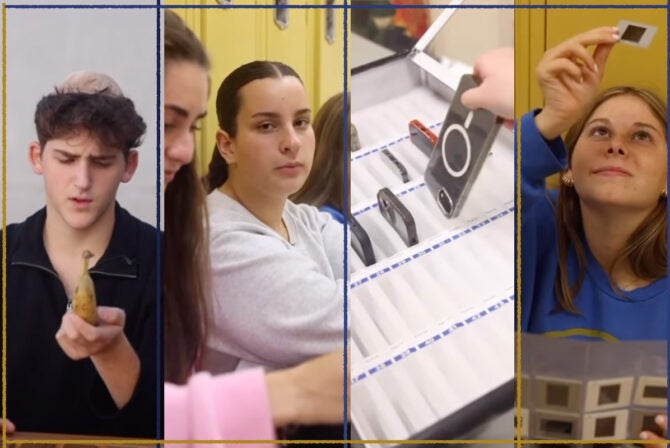On Friday afternoon, while I was alone with my infant daughter for a moment, there was a knock at the door of our hospital room. A short, pudgy woman–who just begged to be called Bubbe–pushed her reading glasses up on her nose and looked down at her clipboard, “Are you the Rosen-Prinz family?”
“Yes,” I replied quietly as the baby lay asleep in my arms. I had become accustomed to the constant daily interruptions after many days in the pediatric intensive care unit where doctors worked tirelessly to diagnose my baby with what we would come to learn is a very rare illness.
“Would you like a Shabbat kit?” she offered.
I hadn’t heard of such a thing but was intrigued. “Kit” made it sound like it offered complete spiritual fulfillment in a box. “Sure, leave it on the rollaway cot.” There really was nowhere else to put it in our cramped hospital room. What little space we had was entirely overrun with trays of stale food, pink plastic water pitchers overflowing with melted ice, toys in need of sanitizing, wilted floral arrangements, and other comforts as we tried to make ourselves at home.
I had been measuring time by the nurse’s shift changes and I wasn’t even aware what day it was until this gesture jarred me back into reality. It was Friday, Shabbat was about to begin, and we had been in the hospital all week.
After Bubbe left, I opened the kit to examine its contents. It contained two “candles,” which were actually flameless, battery operated, flickering LED tealights, two individual challah rolls, and a miniature bottle of kosher grape juice. It also included a little pamphlet with the familiar Shabbat blessings: Shabbat lights, Kiddush, and Ha-motzei, in Hebrew as well as transliterated English for the uninitiated or out-of-practice davener.
On the infrequent occasions that we lit candles in our home, I would fumble through the prayers, self-consciously waving my hands over my eyes, but trying to set an example for our children. Yet, I confess that I never felt connected to the words I was chanting. I could recite the Hebrew words but I could not tell you what they meant, and that disconnect left me unfulfilled.
When my husband returned to our room it was nearly sundown and I showed him the kit. He was excited and wanted me to make the blessings right then and there. While our sickly babe gurgled in the background with tubes and tangled wires protruding from her in every direction, we lit the candles (by turning them on), enjoyed our “wine” and noshed on the dainty bread. It was a relief to have a moment of spiritually mandated tranquility after a week of unrest. And I finally felt the spiritual connection for which I had been longing.
I had been thinking about praying all along. Earlier that week when our daughter first became seriously ill and no one could figure out what was wrong with her, I wanted to pray but I didn’t know how to go about it. I did a cursory iPhone search to find a blessing for a sick child and considered texting my Orthodox neighbors to ask for prayers, but I couldn’t bring myself to follow through amidst all the commotion. It felt disingenuous to suddenly have the urge to participate in religion just as things were not going well in my life. I thought about the adage that in the most challenging and tenuous moments, faith can guide us if we let it. I craved that guidance but struggled with how to give myself over to it.
What stopped me? Perhaps it was my long-standing conflict with faith. I had always been a proud cultural Jew, but after a college degree in Philosophy I knew enough about the art of argumentation to prevent me from committing to a belief in much of anything. I generally limited my spiritual life to the Jewish-lite variety and I always maintained a hearty dose of skepticism with regard to all my religious practices.
There is nothing quite so cliche as facing mortality (whether one’s own or, worse, that of one’s child) to bring a person to religion. Anyone would bargain, even plead, with God for a child’s safety. Many of us might wonder if we had done something to invite potential tragedy into our home. Too few mitzvahs? Not enough tzedakah (charity)? I wondered if my general lack of faith had something to do with my daughter’s feeble state and I struggled to find meaning in the frightening experience.
But it was now Shabbat and we had an opportunity to take a break from the intense week of anxiety and indulge in a little peace. After a period of uncertainty, my daughter’s precarious health was beginning to improve and it felt like time to exhale, finally.
Thank God my daughter fully recovered from her frightening illness. I can’t say that since this experience we celebrate Shabbat each week with a new religious fervor, because we don’t. And I won’t claim that celebrating Shabbat was a panacea for all of my spiritual ails, because it wasn’t. But when I think back on that grim time and how that one night brought a little light into an otherwise dark period for my family, I am grateful. And now, when Shabbat faithfully arrives each week, I remember that special night in the hospital, and the comforting flicker of those plastic battery powered candles, and once again, I feel connected.
Like this post? Get the best of Kveller delivered straight to your inbox.







